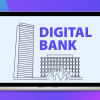Do we really need digital banks?

The $460 billion economy of Bangladesh is overburdened with 61 banks. While banks should be approved based on financial and economic viability, some were granted based on political consideration. Such a growth created unhealthy competition among banks.
Their asset management did not improve over time. The poor management of assets resulted in a huge rise of non-performing loans (NPLs), which stood at Tk 120,649 crore at the end of 2022. The central bank's Financial Stability Report 2022 showed that total risky loans stood at Tk 377,922 crore. Of course, the performance of the banking sector has declined tremendously. The growth of NPLs calls for increasing provisions, which a number of banks failed to maintain. As per Bangladesh Bank data, the amount of required provisions was Tk 86,270 crore in June 2022 against which Tk 73,050 crore was maintained. This produced a provision maintenance ratio of nearly 85 percent.
In addition, the fall of asset quality requires a corresponding increase in equity capital, as set by Basel Accords. While banks are required to keep at least 12.5 percent capital of their risk-weighted assets, as of June 2022, the capital adequacy ratio for all banks was 11.2 percent. Foreign commercial banks had a ratio of 26.4 percent, more than double the required. In contrast, state-owned commercial banks (SCBs) could maintain only 6.4 percent, half the required rate. But the worst situation was of specialised banks (SBs), which had a capital adequacy ratio of -35.8 percent.
Furthermore, non-performing assets also deteriorated bank profitability because provisions have to be maintained from profit. This decreased the amount of profit which eventually reduced the average return on assets (ROA) to only 0.5 percent and return on equity (ROE) to 9.4 percent, as per BB's June 2022 report. In comparison, the ROA and ROE of SCBs stood only at 0.2 percent and 5.4 percent, respectively. Even worse, the rates for SBs were -3.3 percent and -13.7 percent, respectively.
Some banks with high NPLs have also failed to attract new deposits. Consequently, at times, they could not even honour small-denomination checks let alone sanction fresh loans, creating a credit crunch.
Instead of solving these problems, the country's banking sector brought considerable improvement in agent-banking operating in remote areas and mobile banking through apps. As such, BB recently invited applications for digital bank licences.
Digital banks, being convenient and efficient, primarily operate online through digital channels such as websites and mobile apps. It is argued that digital banks would bring financial services to a wide range of Bangladeshis by reducing the cost of banking and making banking services easily accessible. However, with limited digital infrastructure, low internet penetration, low financial literacy, lack of information technology (IT) awareness, and high cybersecurity threats, the potential may not be reaped fully. Rather digital banking may prove to be a disaster if cybersecurity cannot be maintained. Every system has its own weakness, which is not thought of during its development.
In February 2016, our own Bangladesh Bank came under the country's worst cyberattack, with tens of millions of dollars robbed and still remaining unrecovered. Many lessons may be learned from this. But what about the money lost? It is doubtful that it will ever be recovered.
Banks collect deposits, grant loans, and conduct numerous other financial transactions. They also generate big amounts of data. Banks' main challenge is to secure this data and build trust on the system. All banks know that every system will ultimately be breached and that this cannot be stopped. Developing a system that is easily accessible to banks and difficult to access for hackers is a real challenge. Although app developers want to be one step ahead all the time, in reality, hackers are usually one step ahead of them instead.
The economic system of a country can be broken down by one cyberattack on its banking system. While there are dedicated hacktivists and cybercriminals for the sole purpose of robbing money, many of them engage in hacking not because they want to make money but because they see it as a challenge. But what is sport to hackers is certainly disastrous for customers of banks. Moreover, there is no guarantee that the app engineers themselves will not be involved in hacking.
Hence, digital banks must have strong encryption to protect information from internal and external threats. To this end, bankers should be trained on the workings of the system regularly. The security system of a digital bank has to be updated regularly. Customers must have some level of financial literacy and should be educated about the security features of digital banking. To provide flawless service, digital banks will have to work in cooperation with other institutions whose standard must also be at par. Still, if there is any breach into the security system, there has to be a way to identify it quickly and minimise the losses – both financial and informational.
The banking sector in Bangladesh is at risk, given its huge amounts of distressed assets. It suffers from a lack of financial discipline. Long-standing poor governance is reflected in an increasing number of financial scams. Operational inefficiency is evident from a high expenditure-income ratio over the last decade. A few banks appear viable only on paper, with the NPL rates of several banks being more than 35 percent.
BB's priority should be to streamline the banking system by addressing these issues. Online banks in Bangladesh are fertile ground for looting money. And the approval of digital banks without proper preparation could be a step in the wrong direction for the entire banking sector. Any lack of awareness on any ground may create enormous security risks for digital banking. Weak security systems may turn digital banks into platforms for plundering the money of depositors – the weakest section of banks' stakeholders.
In order to approve a digital bank licence, Bangladesh Bank may use a benchmark for applicants that will improve the country's overall economic condition. For example, if the applicants are banks, their NPL rates (the benchmark) must be less than five percent and they should have decent online banking operations.
Dr Md Main Uddin is professor and former chairman of the Department of Banking and Insurance at the University of Dhaka. He can be reached at [email protected]

 For all latest news, follow The Daily Star's Google News channel.
For all latest news, follow The Daily Star's Google News channel. 













Comments